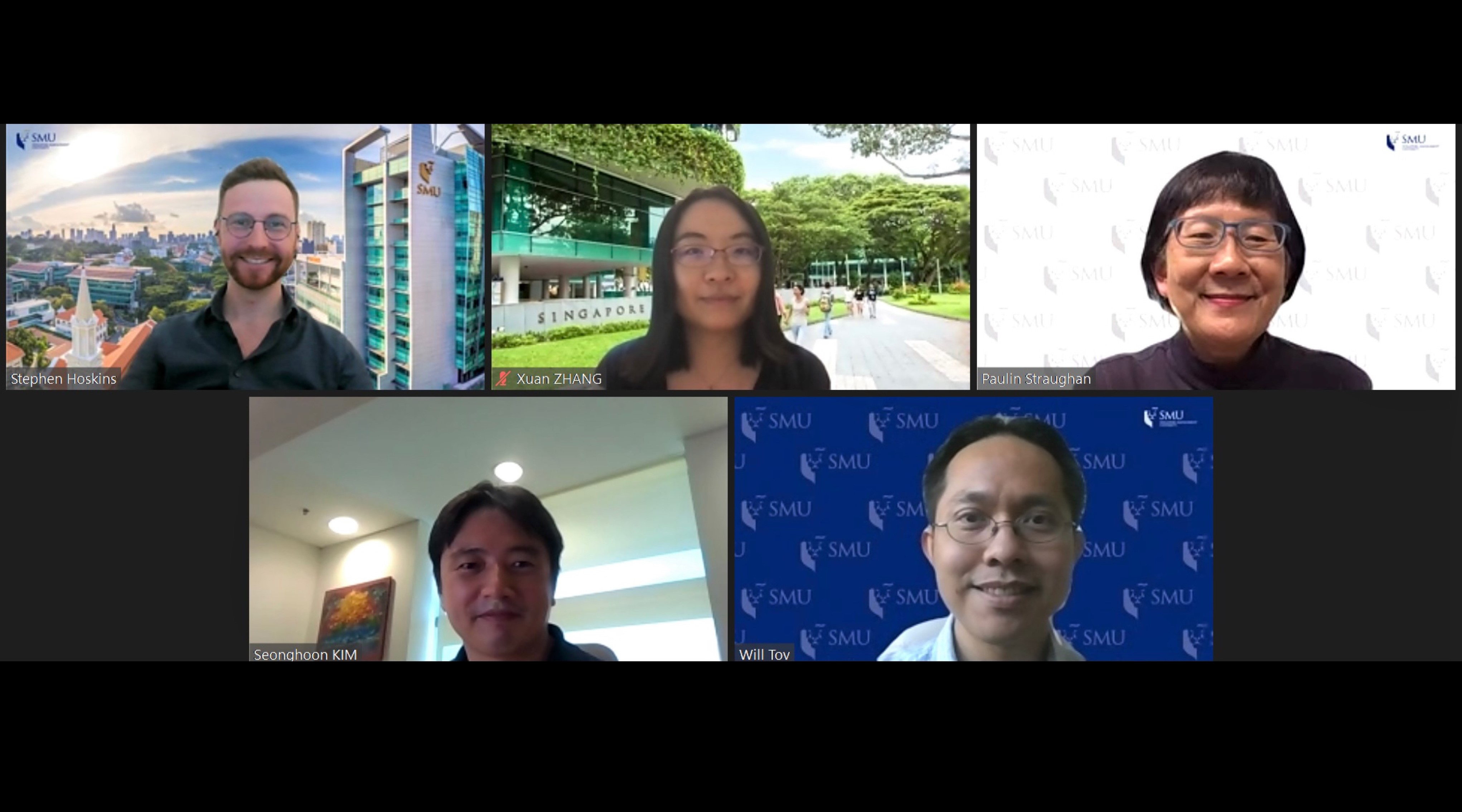
Top (left-right): ROSA Principal Research Associate Stephen Hoskins; SMU Assistant Professor of Economics Xuan Zhang; ROSA Director Professor Paulin Straughan.
Bottom (left-right): ROSA Deputy Director Assistant Professor Seonghoon Kim; ROSA Deputy Director Associate Professor William Tov.
By Sheryl Lee
SMU Office of Research & Tech Transfer – The Spanish influenza pandemic of 1918 had an unusual killing pattern: as the disease ravaged populations, it disproportionately affected healthy youths, including millions of World War I soldiers. More than a century later, another pandemic has our world in a chokehold; this time, however, it is older adults who are experiencing greater adverse effects: more severe complications, higher mortality, disruptions to social and psychological well-being, and other negative repercussions.
To investigate how well older adults aged 55 to 75 in Singapore have adapted to this new normal, academics at the SMU Centre for Research on Successful Ageing (ROSA) tapped onto a powerful resource: the Singapore Life Panel (SLP). A comprehensive survey tracking broad socioeconomic data over time, the SLP gives researchers insight into the lives of seniors – with implications on social policies designed to help them. An update focused on COVID-19-related findings was presented and discussed at a virtual policy roundtable on 3 March 2021.
How the ‘circuit breaker’ impacted well-being
ROSA Principal Research Associate Stephen Hoskins kicked off the session with an overview of well-being trends among older adults in 2020. Before the pandemic, more than half of respondents had indicated they were “satisfied” or “very satisfied” with life on the whole, Hoskins said. “That started to decline in March,” he added, “and took a big hit in April when we started circuit breaker” – a period of stricter stay-at-home restrictions that ended in June 2020.
In July, as social distancing measures eased, well-being started increasing again, Hoskins noted. “But satisfaction with life overall has not quite come back to the baseline level,” he shared. “That likely reflects the fact that we still have restrictions on social activity and ability to travel.”
Further examining the issue from an economic and material well-being perspective, Assistant Professor Xuan Zhang from the School of Economics presented research that showed large reductions in consumption spending in April and May, with declines of more than 20 percent among older adults surveyed.
The wealthiest households reduced their consumption the most for such discretionary expenditures as entertainment and travel, Professor Zhang noted, with implications on government subsidy policies. Subsidies that decline with rising household income might be more effective in stimulating the economy, since it would help families with budget constraints who actually spend their money, she pointed out. “If you transfer the money to richer households, they may end up saving the money, instead of spending it,” she said.
Supporting psychological resilience
More than economic and material satisfaction, a person’s well-being is influenced by myriad factors including their health, social interaction and even resilience levels. Focusing on older adults in particular, ROSA Deputy Director Associate Professor William Tov and ROSA Director Professor Paulin Straughan embarked on a research project to investigate the relationship between psychological resilience, which they defined as the respondent’s perceived ability to cope with and recover from adversity, and well-being in the context of the circuit breaker.
“It’s quite natural for us to think that a resilient person is more likely to have a higher level of well-being than a person who’s not very resilient,” Professor Tov said. “But I think it’s also important for us to understand that the other direction is also possible… that high levels of well-being can also contribute to resilience.”
Taking the audience through their findings, Professor Tov concluded that high levels of health and social satisfaction before the circuit breaker predicted resilience afterwards, emphasising the significance of support structures and policy interventions in maintaining societal well-being in the long run.
“We tend to think of psychological resilience as a personal matter, as a person’s own confidence in their ability to cope,” he said. “Our analyses show that resilience is actually aided by a person’s social network and social support structures, and having those in place is important.”
Digitalising to stay connected
Further advancing the discussion on social support for older adults, Professor Straughan took to the virtual stage to share policy recommendations based on her study with Professor Tov. Their findings highlighted that life satisfaction in older adults is negatively influenced by feelings of social isolation, but this is mitigated by frequent digital contact and participation in social activities.
“It is important that we ensure our seniors remain socially integrated and socially active, so that we can safeguard their well-being,” Professor Straughan said. “For those living alone, there is a risk of social isolation. We can’t control their living arrangements, but policymakers should encourage greater participation in community activities among this group of seniors.”
Professor Straughan brought up examples of government programmes and initiatives led by voluntary welfare organisations that could alleviate social isolation and increase well-being among seniors. “Digital communication is an effective way for seniors to reduce social isolation,” she shared. “It’s important for us to prioritise initiatives such as the [Infocomm Media Development Authority’s] Seniors Go Digital programme… to improve the digital skills of seniors and empower them to stay connected.”
Health implications for the future
ROSA Deputy Director Assistant Professor Seonghoon Kim next zeroed in on the physical health impacts of COVID-19 on older adults. His research noted that the outbreak’s ramifications were not just limited to those who had contracted the disease; older adults in general visited the doctor’s less frequently during the circuit breaker, and such delayed healthcare access could lead to longer hospital stays and poorer health outcomes in future.
To mitigate these repercussions, Professor Kim suggested adopting policies that would allow essential healthcare services to continue functioning, albeit differently, in the new normal; for example, promoting tele-health practices on a large scale so patients stay connected to their doctors, or educating individuals on self-care for chronic conditions such as diabetes and hypertension.
He also emphasised the need for the government to monitor the long-term health effects of older adults who delayed healthcare screenings and tests. “There could be a potential long-term cost of undetected health conditions during the early period of the pandemic,” he shared.
Back to Research@SMU May 2021 Issue
See More News
Want to see more of SMU Research?
Sign up for Research@SMU e-newslettter to know more about our research and research-related events!
If you would like to remove yourself from all our mailing list, please visit https://eservices.smu.edu.sg/internet/DNC/Default.aspx

